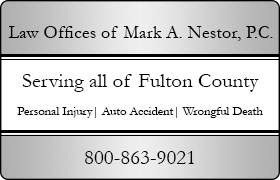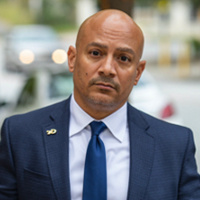 Atlanta RICO Act Lawyers, Georgia
Atlanta RICO Act Lawyers, Georgia
Sponsored Law Firm
-
 x
x

Click For More Info:
-
Law Offices Of Mark A. Nestor, P.C.
3680 Holcomb Bridge Road Suite 150 Norcross, GA 30092» view mapPersonal Injury, Auto Accident, Wrongful Death Norcross Accident & Injury Law
Attorney Nestor has been licensed to practice in the state of Georgia since 1995. He helps clients in Accident & Injury, Estate, Lawsuit & Dispute, Traffic and Real Estate matters.
800-863-9021
Not enough matches for Atlanta RICO Act lawyer.
Below are all Atlanta Criminal lawyers.
Sponsored Lawyers
1-10 of 78 matches
Criminal, Lawsuit & Dispute, Real Estate
Randy Williams is a recognized litigator, partner, and co-founder of Williams & Thomas. He specializes in complex litigation, criminal defense, and real estate transactions for the metropolitan area. Randy brings business and executive ingenuity to the firm's leadership. He obtained his Doctor of Law from Emory University where he prosecuted misdemeanor and felony crimes under the Fulton County Solicitor General and Dekalb County District Attorney. Prior to practicing Randy served as an executive gaining extensive experience in various areas of business management. In his spare time, Randy enjoys playing tennis, mentoring, traveling, and spending time with family and friends.
(more)Accident & Injury, Criminal, Traffic, Bankruptcy & Debt, Real Estate
Serge Jerome Jr. is a licensed Georgia Trial Attorney. He focuses his practice on Criminal Defense and Bankruptcy Law. He only cares about doing what's right for the people he represents. He is a member of the Atlanta Bar Association, Gate City Bar Association, Georgia Association for Women Lawyer (GAWL), The Georgia Association of Black Women Attorneys (GABWA) and the Georgia Trial Lawyers Association. Attorney Jerome obtained his Law Degree (Juris Doctorate) from Florida A&M University where he was a member of the FAMU Law Trial Team competing in both Moot Court and Mock Trial competitions, Parliamentarian for the Black Law Student Association (BLSA), and President of the Caribbean Law Student Association (CLSA). He graduated with a Bachelors of Science degree in Finance from Oral Roberts University where he was a member of the ORU Outreach Ministries, American Marketing Association (AMA), and the Finance Club. Attorney Jerome does Pro Bono work through Atlanta Volunteer Lawyers Foundation (AVLF), the Atlanta Bar, and World Changers Legal Resources Department. The son of a Bishop and a licensed minister himself, Jerome enjoys giving back to the community and helping others. He traveled on over 20 missions to Haiti and other foreign countries. On the weekends, he volunteers as a coach with World Changers youth basketball and East Point Little League baseball teams. He is a member of the Urban League of Greater Atlanta and Atlanta Habitat for Humanity's Young Professionals Network. In his free time, Jerome likes to experience new places and cultures through his travel club, play kickball with his local league team, surf whenever he's by the beach, cook to exercise his creative muscles, and read spiritual books and biographies to keep life in perspective.
(more)Criminal, Felony, DUI-DWI, Traffic, RICO Act
Mr. Reeves is from Newnan, Georgia. He graduated from the University of Alabama with a Bachelor’s Degree in both Criminal Justice and Political Science. He then graduated from Atlanta’s John Marshall Law School in 2010 after taking a year off to work at Hawkins, Parnell & Young, LLC in the Asbestos and Products Liability Litigation Divisions. Tracy began his legal career as an Assistant District Attorney in the Coweta Judicial Circuit. There he helped in establishing the Gang Intelligence Network as well as training prosecutors and law enforcement officers in investigating and prosecuting gang cases. Tracy was also the head of the Coweta Child Protocol that aided in the investigation and prosecution of allegations of child physical and sexual abuse. Tracy then moved to the DeKalb County District Attorney’s Office where he served as a Senior Assistant District Attorney in both the Trial Line Division and the Sexual Exploitation and Crimes Against Children Unit. Mr. Reeves utilizes this experience to ensure that your rights will be protected in every aspect of your case; from arrest to trial. Capital cases, gang cases and child cases demand specialized skills, training and experience to defend due to the complicated nature of these cases. Mr. Reeves has successfully resolved cases from traffic citations to murder. Every client and case are important to Mr. Reeves and he remains accessible throughout the process.
(more)Accident & Injury, Criminal
John Dixon grew up outside Nashville, Tennessee, but has called Atlanta home for over twelve years. He graduated from Vanderbilt University in 1997 and the University of Tennessee College of Law in 2001, where he finished in the top 10% of his class. John is licensed to practice law in Georgia, Tennessee and New York, and has over 18 years of experience representing all types of clients, including Fortune 100 companies and small business owners; however, today John finds it most rewarding to serve clients facing legal challenges in criminal matters and personal injury claims in Georgia. John has a 10 year-old son and 8 year-old daughter in Atlanta Public Schools, and enjoys spending his spare time trying to keep up with them.
(more)Divorce & Family Law, Estate, Power of Attorney, DUI-DWI, Traffic
Chimere Chisolm Trimble is an award-winning attorney and passionate leader in the Georgia legal community, known for her work throughout South Georgia and the Atlanta Metropolitan area. As founder of Chisolm Trimble & Associates, she has been providing legal representation to clients from her offices in Atlanta (Midtown), Douglasville, and Albany. Focusing in the areas of family law, including divorce, custody, spousal / child support, legitimation and estate planning. “I am focused on protecting the legal rights of each one of my clients," says Attorney Trimble “Every Georgian deserves a committed understanding attorney who is well versed in the laws of our state and who is willing to fight for them.” Attorney Trimble’s varied and accomplished legal career includes work with the North Carolina Justice center, previous Staff Attorney to three Superior Court Judges, former Assistant City Attorney, selection to the Georgia Super Lawyers five years straight, served as Regional Vice President for the Georgia Association of Black Women Attorneys, as well as a Municipal Court Judge, Executive Board Members to several non-profit organizations and most recently Chairperson to the Family Law Section of GABWA.
(more)Criminal, Real Estate, Accident & Injury, State Appellate Practice, Car Accident
Judge Marc Pilgrim is a proud graduate of the University of Georgia School of Law and has been practicing law for over twenty-eight years. He currently serves as a part time Probate Court Judge in Fulton County. His primary practice areas are criminal law, probate, estate planning, real estate and personal injury. During his extensive legal career, he has fought for the rights of his clients in front of Judges throughout the state, including the Supreme Court of Georgia. His diverse legal background allows him to identify defenses and legal strategies which gives his clients the edge during trials and in negotiations with prosecutors. As a trail attorney, Marc used his teaching gifts for making complex legal concepts easy to understand for his clients and for the courts. As a professor, Marc taught civil procedure, property law, business law and paralegal studies in the traditional setting at Morris Brown College. In addition, he taught an accelerated paralegal studies program at the University of Georgia's Gwinnett Campus, training the next generation of paralegals with practical and textbook knowledge of the legal profession. Marc's ability to simplify concepts is of great benefit to his real estate practice where new buyers often have questions about the process and the documents they are signing. His sincere desire to help them understand creates a stress free and efficient closing experience for buyers, sellers and agents. Marc believes in providing the most convenient closing experience for all parties and doesn't mind taking the closing experience outside of his office, providing mobile closing services for clients on both ends of the transaction throughout the metro area. Marc explains his client-centered approach to his real estate practice this way, “I try to work with my client's busy schedules. I let them go as fast or as slow as they need and take the closing table to them whenever closing at the office in the traditional setting is not convenient for them. When they close with me, they will feel as though they understand the documents and walk away satisfied and without losing excessive time away from their work or other obligations. In his free time, Marc enjoys listening to history podcasts and spending time with his wife and family. Marc and his wife April are active members of North Avenue Presbyterian Church in downtown Atlanta where Marc serves as an ordained Deacon. Marc's wife is also a real estate broker and when not selling real estate, she assists him in his real estate closing practice. She and Marc both know first-hand the stressors agents and their clients experience in the stressful process of buying and selling homes. You will not find a more agent accommodating closing attorney than Marc Pilgrim!
(more)Criminal, Motor Vehicle, Accident & Injury, Nursing Home
Daniel was born and raised in Marietta, Georgia. He graduated from the University of Texas at El Paso with a Bachelor of Arts in Political Science. He earned his Juris Doctorate from the University of Texas, and he holds a Master of Healthcare Administration from Seton Hall University and a Master of Business Administration, with a concentration in International Business, from the University of Texas at El Paso. Daniel holds a double certification in Healthcare Compliance and as a Compliance and Ethics Professional. Daniel manages the Law Office of Daniel R. Crumby, LLC, where he focuses on complex litigation and business law including white-collar defense; defense of corporate, and individual clients in state and federal courts around the country; medical malpractice; nursing home and elder abuse; healthcare compliance and investigations; personal injury, and criminal law. Prior to starting his practice, Daniel worked at a mid-sized law firm in Atlanta, and he specialized in criminal and civil healthcare-related white-collar cases, medical malpractice, healthcare compliance, internal investigations, and defending insurance companies and their insurers in complex cases, including lawsuits filed against skilled nursing facilities and assisted living facilities. Immediately prior to working at a civil defense firm, Daniel defended the United States and its agencies in federal and state courts, and he served as a federal prosecutor in the Southern District of Georgia and the Western District of Texas. As a federal prosecutor, Daniel directed and prosecuted numerous cases including healthcare fraud, bank fraud, procurement fraud, mortgage fraud, wire fraud, theft of government funds, drugs and alien smuggling, child exploitation, human and sex trafficking, and other criminal violations. In 2014, Daniel received a Commendation from the Federal Bureau of Investigation Director, James B. Comey. Daniel previously served in the United States Army as military police and as a Judge Advocate General (“JAG”) officer in a variety of assignments before resigning his commission as a Captain. The Army twice awarded Daniel the Meritorious Service Medal, Army Commendation Medals, Army Achievement Medals, and the Fort Bliss Ambassador Award, among others, for his military service. Daniel is a member of the State Bar of Georgia, State Bar of Texas, the United States Court of Appeals for the Fifth Circuit, and the United States District Courts for the Northern District of Georgia and the Western District of Texas.
(more)Criminal, Accident & Injury, Health Care, Traffic, Consumer Rights
The Toler Law Group specializes in fighting to protect and enforce your 4th amendment right. Many Sex Crime lawyers want you to plead without investigating to see whether there is reason to contest the case. The consequences of a Sex Crime charge are too severe to overlook even the smallest detail. If there is evidence to support your innocence, we will advocate on your behalf, either in or out of the courtroom. The Henry Toler Lawyer Atlanta Firm specializes in contested cases in your Sex Crime related accusation. A Sex Crime charge does not mean a conviction. The Toler Law Group has built our reputation through expertly handling many cases over the last 20 years. Don’t allow yourself to walk into the courtroom without consulting an experienced attorney about your case. Henry Toler Lawyer Atlanta offers a FREE initial consultation over the phone or in our office. The Toler Law Group simply offer our best analysis of the case at hand and offer to help you resolve your case as positively as possible if you request we do so.
(more)Real Estate, Criminal, Estate, Employment, Business
“We take pride in the fact that Weener Nathan Phillips is not your ordinary service provider. Our clients know that we’re in this together – whether in the trenches side-by-side, preparing to take on a challenge or in a conference room, celebrating the exciting growth of their business as one through a hard-won merger, franchise structuring or real estate investment. We’re more than just legal counsel, we’re a partner – a vital extension of their team.” ~ Eric Nathan, Partner Driven by a desire to learn new things, tackle challenges, solve problems and foster long-term relationships, Eric J. Nathan has proven a natural fit as a partner to a fellow attorney, Phil Weener. Since joining the firm in 1994, many of his earliest clients continue to work with him today. A self-described people person, Eric most enjoys the practice of “happy law” – where everyone is smiling and excited about the possibilities the future may hold for their business. His areas of expertise include commercial real estate, mergers & acquisition, mediation, litigation, and the imparting of general business advice. Weener Nathan Phillips clients describe him as competent, collegial, always smiling, and comforting when needed.
(more)Bankruptcy & Debt, Lawsuit & Dispute, Criminal, Accident & Injury, Business
Chuck Douglas is a practicing lawyer in the state of Georgia. He received his J.D. from Georgia State University. He currently works for his privately owned firm of Wakhisi-Douglas, LLC.
(more)


 Mark Nestor Norcross, GA
Mark Nestor Norcross, GA AboutMark Nestor
AboutMark Nestor ServicesPractice Areas
ServicesPractice Areas










